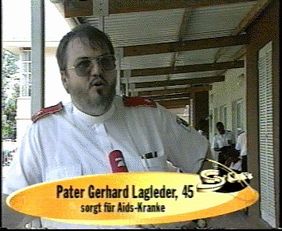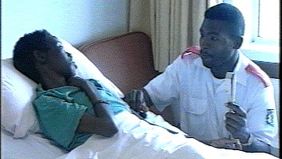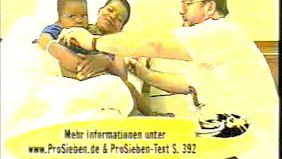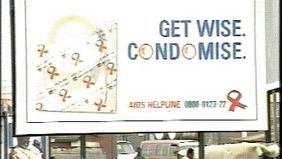Khululiwe is only 15 when she becomes a mother. Particularly tragic: the young woman is already infected with the deadly HIV virus and so her baby is also born with the deadly pathogen. See now the fate of a small family from South Africa, a country where more and more children are dying of AIDS.
Thembinkosi is only three and a half years old. He will not live to see his fourth birthday. He has AIDS. Like his mother Khululiwe. The young woman is 18 and her organs are already severely damaged. In a few weeks she will be dead. Aids drugs that could prolong her life do exist, but they are unaffordable for almost all South Africans.
Khululiwe, 18, has end-stage AIDS: "I have insane pain, can hardly breathe and can no longer stand up. I know that I will die soon - and I know that my son will die soon too."
Khululiwe and Thembinkosi live here. And this is also where they will die, amidst rolling hills. In a seemingly perfect world. But this world is the AIDS hell of South Africa. Philipp Hahn, s.a.m. reporter: "A whole country is dying here. One in five South Africans is now infected with the deadly virus. Here in the kwaZulu-Natal region, two million out of three million people are already infected and in some areas an incredible 90% are HIV-positive. Nowhere else in the world is the epidemic spreading as rapidly as it is here."
But only a few have taken up the hopeless fight against death. Father Gerhard Lagleder, whom we meet in his hospice in Mandeni, is one of them. For four years, the monk from Bavaria has dedicated his life to the dying of KwaZulu Natal. He is supported by about ten volunteers [per shift / 436 in total], whom he trained himself. Together they care for the terminally ill. Day after day, night after night. But it remains a desperate struggle. Father Gerhard Lagleder, 45, cares for AIDS patients: "It is an AIDS hell. It is a place where AIDS has become so rampant and the problem is that the hospitals are completely overcrowded. The hospitals can't cope with the patients anymore and then when the hospitals see 'well we can't help him anyway' then they just send people home."
But the suffering of these people will never leave Father Gerhard and his helpers. They take in the patients that no one wants any more. They have already accompanied well over 500 people to their death. The three women in this hospital room are now among them. They died of AIDS almost at the same time - a few days after these photos were taken. Her name was Peacky. She was admitted to the hospice in March. Her diagnosis: Aids and stomach cancer. She dies a short time later at the age of 36. Next to her, Pinky. Diagnosis: terminal AIDS. She only lives to be 22. And Nonhlanhla. Diagnosis: Aids with tuberculosis. She is 29 when death relieves her of her agony.
Khululiwe and her son Thembinkosi may be next. But - macabre as it may sound - they are lucky. For they are among the few who are allowed to die in dignified surroundings. Father Gerhard will take care of mother and son until the end. They do not have to perish miserably like almost everyone else in the slums of KwaZulu Natal.
Father Gerhard Lagleder, 45, cares for the terminally ill: "It is a catastrophe we are facing. A catastrophe that cannot be stopped. A catastrophe for which there is no treatment. I think there is only one treatment for it and that is loving affection." And there is no such thing in the slums, where suffering and misery rule life. It is precisely here, in the slums, that the AIDS epidemic is spreading almost unstoppably. The main reasons for this are the ignorance of the men and their readiness to use violence.
Philipp Hahn: "Many South African men believe, for example, that they can cure themselves of AIDS by sleeping with a virgin. This insane delusion contributes to the fact that tens of thousands of girls are raped every year and nobody cares about the victims of this sexual violence. Only insurance companies have tried to change this sad fact. They wanted to offer insurance for the equivalent of four marks that would cover the medical costs after a rape. But in slums like this one, no woman can afford that." In addition, women don't count for much in the society of black South Africans. Not even in the family. It is difficult to resist. Obvious sayings like "two beers and she's yours" are often taken for granted. Khululiwe is also probably a rape victim, and her son possibly a rape victim. The terminally ill woman does not want to confirm this. But she does not deny it either. Cautiously we ask her if she is a victim of sexual violence. Her answer comes only very hesitantly: "I don't want to talk about that." Khululiwe is not an isolated case. In total - experts estimate - one million women in South Africa are victims of sexual violence every year. Statistically, every South African woman is raped twice in her lifetime. But only very few dare to report it. If they do, they are not taken seriously. No - you don't talk about sex in South Africa. A fatal mistake. Because only education can slow down the epidemic. But there is hardly any sex education. Philipp Hahn: "This poster is supposed to get people to use condoms during sex. It is the only poster far and wide, and besides, only very few people can read what is written on it. Another example of scandalous education policy: A few months ago, the South African Department of Health distributed one hundred thousand condoms in this region, even with instructions for use on a kind of leaflet. But these had been stapled to the rubbers beforehand and so the condoms were distributed with holes in them."
Murderous negligence. Of course, this is no way to defeat AIDS. On the contrary: more and more people are dying earlier and earlier, partly because the state is failing. Even now, very few people live to the age of 40. Almost 300 people are currently buried every day in KwaZulu Natal. Unless a miracle happens, this number will soon triple. The space in the cemeteries is slowly becoming scarce...
Father Gerhard Lagleder, 45 "Angel of the terminally ill": "I often compare the AIDS situation here in South Africa with the Titanic ship. There are about 10 % who are not HIV-positive and those would be the people who sit in the rescue boats and the other 90 % who sink. There is nothing you can do. The only thing you can do is to do what is told about the Titanic, which is that this orchestra was still playing, that we try to reach out to people in their dire situation, show you are not alone, you are safe, you are not dying alone." Little Thembinkosi will not have to die alone either. Even if he lives longer than his mother. Khululiwe, 18, dying mother "He is my only child. It breaks my heart. He has less and less strength. But I know: here he is in good hands."
Father Gerhard Lagleder, 45, wants to build a children's home: "And now I don't know how to go on. We are even thinking of building an extension to our hospice this year and also a children's home, because there is a growing shortage. We are not giving up and I think that is the most important thing in such a very bad situation, not to give up." The children's home should be ready next year. Thembinkosi will not see the opening. But for many others it means that there is still a tiny bit of hope in a country where apparently only death has a future.




